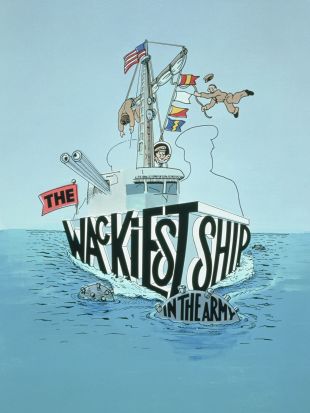
The Wackiest Ship In The Army comes from the same sub-genre of service comedies that yielded Henry Hathaway's You're In The Navy Now, Richard Quine's Operation Mad Ball, Blake Edwards' Operation Petticoat -- it isn't as good as any of those, despite the fact that director/screenwriter Richard Murphy had authored the screenplay for Hathaway's film, and had experience writing for singers-turned-actors (most notably Gene Autry in Back In The Saddle); and that Jack Lemmon had led the cast in Quine's picture. In this instance, the singer-turned-actor in co-starring position is Ricky Nelson, who does get to deliver one song; and Jack Lemmon is thoroughly enjoyable as the exasperated captain (in his first command) of a vessel that wouldn't have passed muster in the FIRST World War, caught up in a secret mission in the midst of the Second World War. The basic problem is that the movie is more amusing than funny (and that only for the first half of the picture), whereas most service comedies do need laugh-out-loud sequences in profusion to succeed. This picture almost makes up for that shortcoming with a supporting cast filled with suitably serious performers, including John Lund, Tom Tully, Richard Anderson etc. And given that it is loosely based on a true story, and intersects with actual World War II events, one can use the serious subtext as a partial substitute for the belly laughs one expects. But the tone is uneven across the length of the movie, from the hijinks and pratfalls in the first half to the serious action in the denouement. It was successful at the time, probably helped significantly by Nelson's presence, as well as the feelings of nostalgia for the war that were abroad in the land in the early 1960s -- it even yielded a short-lived television series of the same name in the mid-1960s, starring Jack Warden and Gary Collins. And the basic plot also anticipates pictures such as Down Periscope (1996), which relied so much on gross-out and sleazy humor that it makes this picture look like a Noel Coward vehicle by comparison. Director Richard Murphy later returned to screenwriting and finished out his career with the surprisingly suspenseful thriller The Kidnapping Of The President, which was actually much closer to his output in his prime, which included the screenplays for Elia Kazan's Boomerang and Robert Siodmak's Cry Of the City.
